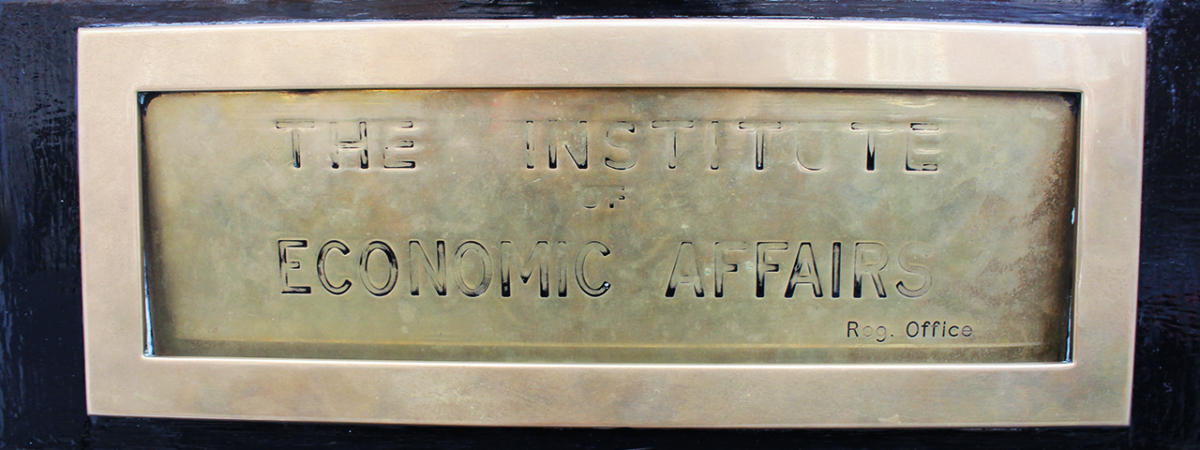IEA report re-published: Plan A+: Creating a prosperous post-Brexit UK
SUGGESTED

Kate Andrews responds to the Leader's speech at Labour Party Conference

Mark Littlewood responds to the Chancellor's party conference speech

Plan A+ was first published in September 2018. Its publication followed the Chequers White Paper, which outlined the approach of then Prime Minister Theresa May and her government to Brexit.
Shortly after its launch, the Charity Commission instructed the IEA to remove Plan A+ from publication, including from the IEA website, then issued the IEA with an Official Warning.
In 2019, following numerous communications and a complaint of unfair treatment by the IEA, the Charity Commission withdrew both the instruction and warning, and accepted much of the complaint.
This edition of Plan A+ is issued with various amendments and clarifications, as described in the Appendix of the paper: Note on Edits to Plan A+. These events are also outlined in the Timeline, published in the new edition of the paper.
The report, Plan A+: Creating a prosperous post-Brexit U.K., proposes the adoption of a four-pillared trade policy strategy, taking unilateral, bilateral, plurilateral and multilateral action to deliver a more competitive and thriving UK economy. These proposals can be understood as part of a possible spectrum of options which the UK could adopt after it has left the European Union.
Plan A+ has been written by Shanker Singham, Director of the IEA’s International Trade and Competition Unit (ITCU) and Dr Radomir Tylecote, ITCU Senior Research Analyst, with input from leading economists and trade experts from across the world, including Sir Lockwood Smith, Alan Oxley, John Weekes, Eduardo Perez-Motta, Stuart Harbinson, Peter Allgeier and Professor Srinivasa Rangan.
The report makes recommendations about what initial moves the UK could make to realise the benefits of leaving the EU, including proposals for how the UK could negotiate with the EU and others, what it could seek in the negotiations and how it could improve its domestic regulatory environment in areas like agricultural policy and fisheries policy.
Its authors highlight the benefits of securing an advanced free trade agreement, with maximum regulatory recognition. They argue the government could seek to retain all of the agreed elements of the Withdrawal Agreement (including the financial settlement, citizens’ rights, and the Transition Period), but propose a new backstop and framework for a future relationship.
The new backstop, proposed in the paper, would comprise of a basic Free Trade Agreement (FTA) between the UK and the EU for goods, and a commitment by the parties to undertake all necessary investment and cooperation mechanisms to enable formalities on trade between Northern Ireland and Ireland to be overseen away from the border. The new framework would aspire to securing a better FTA during the Transition Period, in the style of a UK-EU Free Trade Plus deal.
UK-EU Free Trade Plus deal
An enhanced FTA between the UK and the EU post-Brexit could include:
- Full market access and national treatment
- Zero tariffs in goods including agriculture
- Maximum regulatory recognition for both goods and services and a mechanism to manage differences that arise due to divergence in future
- Baseline intellectual property protection, government procurement and investment rules
- Regulatory coherence, including specific sectoral annexes (e.g. pharmaceuticals)
- Mutual recognition of occupational licensing
- Specific sectoral annexes in key areas including telecoms, data and financial services
Customs arrangements
For the agreement to work, UK customs clearance processes must accommodate a potentially five-fold increase in customs documentation between the UK and EU on the day of Brexit.
The key element of an agreed arrangement is to separate the movement of goods from the processing of forms (electronically or otherwise) for as many traders as possible.
This could be achieved through:
- General inter-agency and authority cooperation and information sharing
- Use of simplified procedures and data processing at points of departure and destination
- Expedited procedures to be made available to qualifying operators and mutual recognition of Authorised Economic Operator programmes
- Operation of self-assessment for importers to declare imports periodically and account for any duties payable
- Agreement that physical inspection of goods is only to be carried out by means of random checks, except in duly justified circumstances
- Recognition of equivalence of security-related risk management systems, and agreement to apply such measures in respect to third country trade
Irish Border
The Irish border issue could be solved with more bespoke technical solutions, including trusted trader schemes and streamlined procedures for small businesses.
To address the Irish border, the UK could:
- Make inland clearance available to all traders (electronic export and import declarations followed up if necessary with checks at premises away from the border)
- Commit to aligning trade relevant aspects of the food and animal health regime in Northern Ireland with that of the EU, with suitable powers devolved to the government of Northern Ireland to enable local politicians to fully cooperate and coordinate with the Irish authorities, in accordance with the Belfast Agreement.
Free Trade Agreements with the United States, China, and other partners
Brexit creates an opportunity for the UK to form trade agreements with partners around the world.
Deals could be pursued if the UK:
- Agrees with existing FTA partners that EU FTAs can be rolled over
- Creates a different model of growth through more even-handed Economic Partnership Agreements with developing countries
- Seeks membership of major existing arrangements which involve more than one country, including the Comprehensive and Progressive Trans-Pacific Partnership and the North American Free Trade Agreement
- Joins numerous WTO groups as soon as possible, and acts as a liberalising force within the organisation
Unilateral Action on independent trade and regulatory policy
Post-Brexit, the UK will have the opportunity to make unilateral moves in domestic policy and trade policy. Reform could include the following:
Tariff Reform
- Lower tariffs to zero on a unilateral basis for intermediate goods, so increasing the competitiveness of domestic manufacturing
- Lower tariffs to zero for agricultural products that the UK does not produce, lowering the price of these goods to the UK market (e.g. bananas, oranges, rice, avocados)
Fisheries
- UK to join the North East Atlantic Fisheries Commission and consider joining other Regional Fisheries Management Organisations, participating in international negotiations on Total Allowable Catches for different fish stocks
- Negotiating bilateral agreements with EU, Norway, Iceland, and the Faroe Islands on access to respective Exclusive Economic Zones and management of fish stocks
- Consider replicating Sustainable Fisheries Partnership Agreements to support developing countries and allow UK fisherman to access more fish stock.
- Subsidies to fishermen could be phased out, while a mechanism is put in place to enable fishermen to seek remedies against imports that have benefited from government distortion.
UK Financial Services
- Apply the EU’s capital requirements only to internationally active banks as intended by Basel III.
- Allow EU-headquartered financial institutions presently passporting into the UK to remain operating in the UK, provided there is cooperation and deference between their home state regulator and the UK financial authorities.
- Abandon the EU’s double volume cap, or at least raise it to 11% and 17% as recommended by the UK’s Financial Conduct Authority (FCA) to facilitate large transactions.
- Reduce the burdens of excessive regulation from MiFID II, CRD IV, UCITS V and Solvency II.
- Pursue a post-Brexit tax system that encourages investment, promotes start-ups and scale-up businesses, and reduces complexities; this could include scrapping the 8% bank surcharge, which pushes UK banks into a higher corporate tax rate than the US federal rate and many EU member states.
Immigration
After Brexit, the government could replace free movement of workers and EU citizenship with an efficient and balanced framework for movement of workers from the EU and the rest of the world. A new immigration policy could consider enabling dynamic recruitment of skills and talent where the market requires it.
Commenting on the report, co-author of the report Shanker Singham said:
“Plan A+ proposes a way to achieve Brexit through an independent trade policy and a new approach to negotiations with our neighbours and to the world at large.
“This would be made possible as the UK departs from the institutions and regulations of the EU, restoring its capacity to set the rules of its own economy and national life. Given the UK has still not left the EU with an agreed deal, these ideas are as important as they were last year.”
Notes to editors:
For media enquiries please contact Emma Revell, Communications Manager: 07931 698 246
To download Plan A+: Creating a prosperous post-Brexit U.K., authored by Shanker Singham and Dr Radomir Tylecote, click here.
On 18th November, the IEA will be hosting a public panel discussion around this report, to debate the UK’s relationship with the EU after Brexit. For more details, and to RSVP, click here.
The IEA does not have a single corporate view on Brexit and these briefings are not intended to promote one model over another. Furthermore, the IEA takes no view of the politics involved in determining the Brexit process.
Plan A+ is a piece of independent research produced by the IEA, and edited through the organisation’s peer review process. For more information, click here.
For a full list of the ITCU Advisory Council members, click here.
The mission of the Institute of Economic Affairs is to improve understanding of the fundamental institutions of a free society by analysing and expounding the role of markets in solving economic and social problems. The IEA seeks to provide analysis in order to improve the public understanding of economics.
The IEA is a registered educational charity and independent of all political parties.



